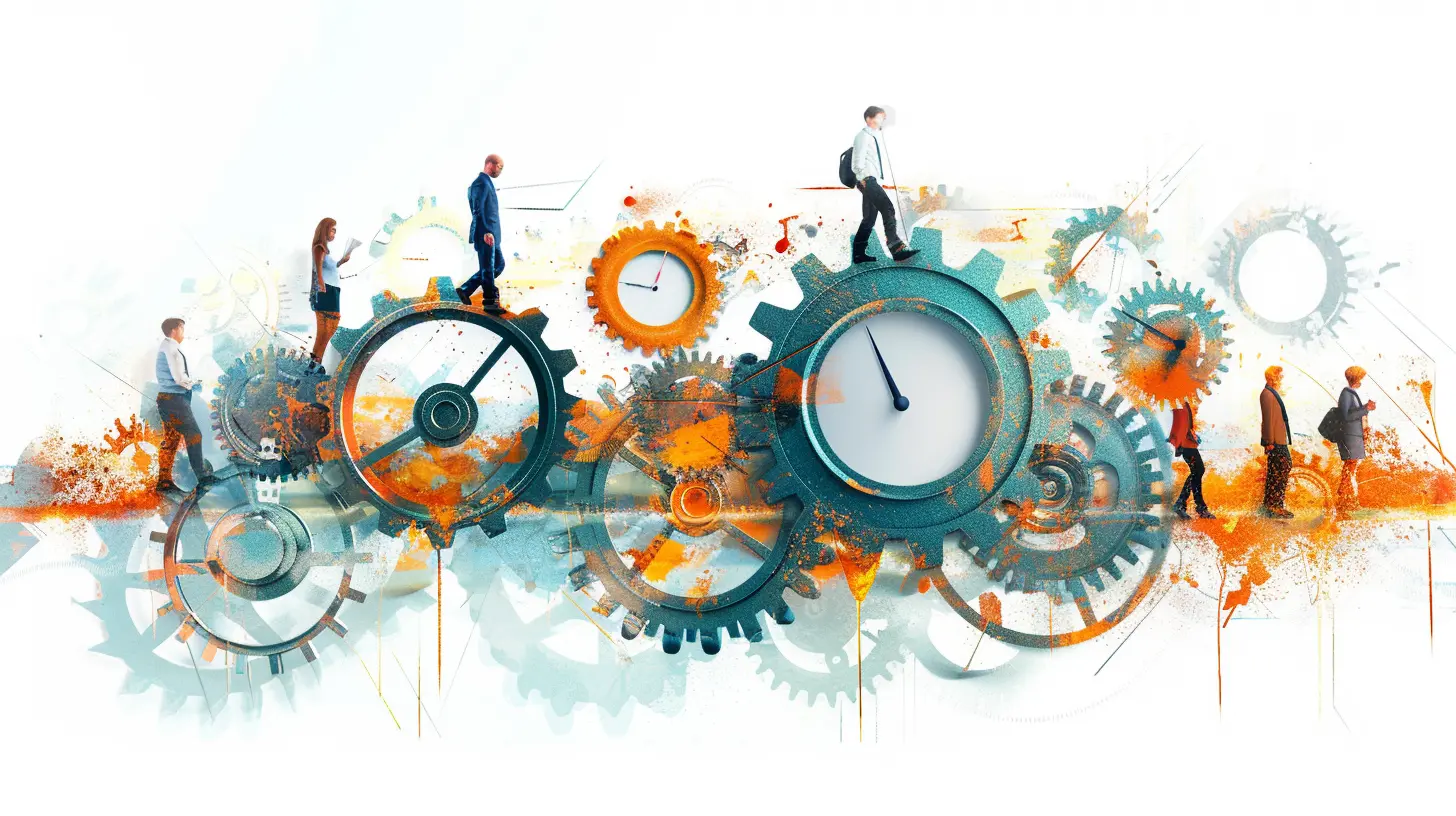Preparing Your Workforce for the Impact of Industry Shifts
13 October 2025
Let’s face it: change is hard, especially when it feels like the ground beneath your feet is constantly shifting. Industries evolve, technology disrupts the norm, and trends come and go faster than you can say "paradigm shift." For businesses, keeping up isn’t just about having the latest tools or adapting to consumer behavior—it’s about preparing your workforce to thrive in the face of these inevitable changes. After all, your people are your greatest asset.
So, how do you ensure your team is not only ready but also excited to face the opportunities and challenges that come with industry shifts? Buckle up—because we’re about to break it all down.
Why Preparing Your Workforce Matters More Than Ever
Picture this: technology and market trends are like waves in an ocean. Some waves are small and predictable, while others are tsunamis that leave businesses scrambling to stay afloat. The companies that survive (and thrive) aren’t just the ones with a sturdy boat—they’re the ones whose crew knows how to sail, no matter the storm.The same goes for your workforce. Industry shifts can lead to uncertainty, resistance, and even fear among your team members. Roles may change, skill sets may become outdated, and new challenges may arise. Without proper preparation, your business risks falling behind. But if your team is adaptable, resilient, and forward-thinking? Well, then you’ve got a competitive advantage that no algorithm can replicate.
The Types of Industry Shifts You Need to Prepare For
Before jumping into solutions, let’s identify the types of shifts businesses typically face. Knowing what you’re up against is half the battle, right?1. Technological Advancements
We’ve all heard about how AI, automation, and machine learning are changing the game. Entire industries have been reshaped by these innovations. Think about how e-commerce has disrupted brick-and-mortar stores or how remote collaboration tools like Zoom took center stage during the pandemic. Tech isn’t slowing down—so your workforce needs to speed up.2. Economic Fluctuations
Recessions, inflation, and global market instability can send shockwaves through industries. During tough economic times, businesses often face restructuring, downsizing, or pivoting to survive. Employees need to be mentally and emotionally prepared to weather these storms.3. Consumer Behavior Shifts
Remember when everyone was obsessed with physical stores, and now e-commerce dominates? Or how sustainability went from being optional to essential? Changes in consumer preferences can force businesses to completely rethink how they operate.4. Cultural Trends and Societal Shifts
Diversity, equity, and inclusion (DEI) policies, remote work culture, and generational shifts in workplace expectations have significantly impacted how industries function. Employees need to understand and adapt to these cultural transitions to stay relevant.
How to Prepare Your Workforce (Without Overwhelming Them)
Okay, so we know the “why” and the “what.” Now let’s get into the “how.” Spoiler alert: it’s not about bombarding your team with endless PowerPoint presentations or dry memos. If you want to make a real impact, preparation has to feel actionable, personal, and even a little inspiring.1. Foster a Culture of Continuous Learning
Think of learning as a muscle: the more you use it, the stronger it gets. Encourage your team to embrace a growth mindset by providing ongoing opportunities to learn and upskill. This could mean enrolling them in online courses, organizing workshops, or even creating mentorship programs within your company.Make it clear that learning isn’t a punishment or a box to check—it’s a way to future-proof their careers. And hey, who doesn’t want that?
> Pro Tip: Gamify the learning process. For example, you can award badges or small perks for completed courses. A little friendly competition never hurt anyone!
2. Communicate Openly About Change
If there’s one thing employees dislike, it’s being kept in the dark. Lack of communication breeds anxiety and rumors—and let’s be real, no one works well in that kind of environment. Be upfront about the industry shifts your business is facing, why they matter, and how they’ll affect the team.This isn’t about painting a doom-and-gloom scenario. Instead, frame change as an opportunity. Use clear, conversational language to get the message across, and leave room for Q&A sessions, town hall meetings, or one-on-one discussions. People want to feel heard, not lectured to.
3. Invest in Technology Training
Sure, we all know that AI and other technologies are reshaping industries, but here’s the kicker: using new tech effectively requires training. Don’t just hand your team a shiny new tool and expect them to figure it out. That’s like giving someone a spaceship without teaching them how to fly it.Create user-friendly, hands-on training sessions to familiarize employees with the tech they’ll be using. Also, celebrate early adopters in the team who can act as in-house “tech ambassadors.” Their enthusiasm might just rub off on everyone else.
4. Encourage Cross-Functional Collaboration
If each department in your company is stuck in a silo, you’re going to have a tough time adapting to industry changes. Encourage your workforce to work across teams and share knowledge. This not only fosters innovation but also helps employees gain a broader perspective.Think of it like this: when team members understand how everything fits together, they’re better equipped to spot opportunities and anticipate challenges. Plus, collaboration makes work a lot more fun—who doesn’t love bouncing ideas off other brilliant minds?
5. Lead by Example
As a leader, you need to walk the talk. If you’re asking your team to embrace change, are you doing the same? Demonstrating adaptability, transparency, and a willingness to learn shows your workforce that change isn’t something to fear—it’s something to embrace.> Remember: your team looks to you for guidance. If you’re calm and proactive during industry shifts, they’ll feel more confident following your lead.
6. Develop Soft Skills for the Future
While technical skills are crucial, let’s not forget about the human element. Soft skills like adaptability, emotional intelligence, critical thinking, and problem-solving are the secret sauce for navigating uncertainty.Workshops, role-playing exercises, and even peer feedback sessions can help employees strengthen these skills. And guess what? These abilities are transferable, meaning they’ll be just as valuable no matter how industries evolve.
7. Recognize and Reward Adaptability
Change can be exhausting, and everyone loves a little validation. Recognize employees who go above and beyond to adapt, learn, and contribute during industry shifts. A simple shoutout during a meeting, a personalized thank-you note, or even an extra day off can go a long way in keeping morale high.> Think of rewards as fuel for momentum. The more you show appreciation, the more engaged and motivated your team will be to keep going.
Overcoming Common Challenges
It’s not always smooth sailing, is it? Preparing your workforce can come with its own set of hurdles. Let’s tackle some common challenges and how to overcome them:- Resistance to Change: Change is scary. To combat this, involve employees early in the process and give them a sense of ownership over the transformation.
- Skill Gaps: Not everyone has the same starting point. Offer personalized training plans to ensure every team member gets what they need to succeed.
- Time Constraints: Employees are busy, and time is a precious resource. Work training into their schedules without overwhelming them, and consider microlearning techniques (short, focused learning sessions).
- Budget Concerns: Preparation doesn’t have to break the bank. Many free or low-cost online resources can help upskill your team. Sometimes, creativity is the best investment.
Wrapping It Up
Preparing your workforce for industry shifts isn’t a box you tick off—it’s an ongoing commitment. It’s about creating a culture where your team feels empowered to grow, adapt, and tackle challenges head-on. Yes, change can be uncomfortable. But with the right mindset and tools, it can also be an opportunity to thrive.Think of it like upgrading your workforce to a newer, more resilient version of itself. And trust me, when the next wave of change comes crashing in, you’ll be glad you did.
all images in this post were generated using AI tools
Category:
Industry DisruptionAuthor:

Susanna Erickson
Discussion
rate this article
1 comments
Zeal Mason
This article highlights essential strategies for adapting workforce skills in a rapidly changing industry landscape.
October 18, 2025 at 3:24 AM

Susanna Erickson
Thank you! I'm glad you found the strategies useful for navigating industry changes.


